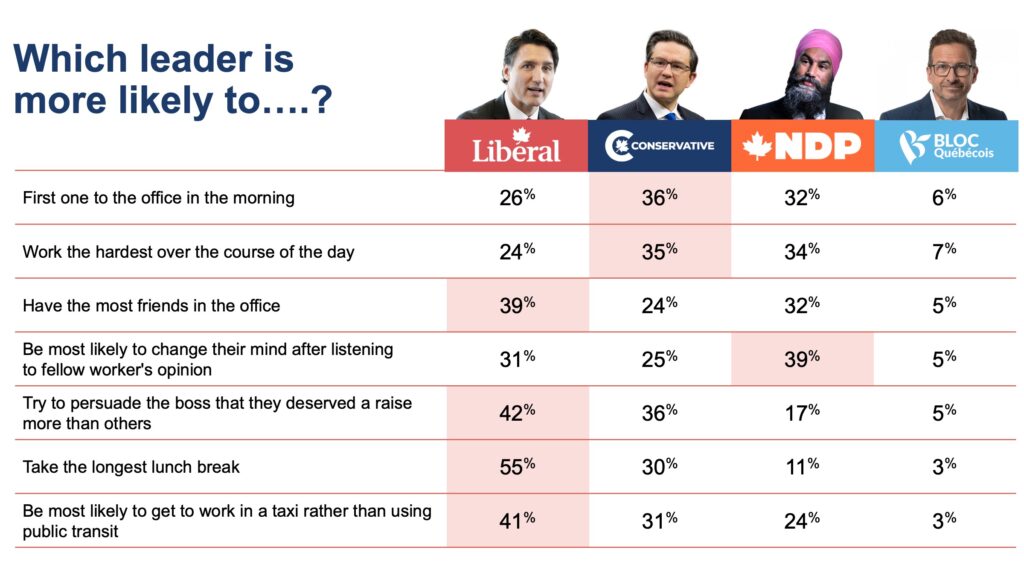Most followers of the news are very familiar with the onslaught of so-called “horse race polls” which tap into voter’s current partisan preference or assessment of the federal political leaders.
Earnscliffe Strategies has joined that fray from time to time and recently launched an on-line survey among 1,559 adult Canadians, but with a little bit of a different approach.
Like virtually all the other pollsters who release surveys to the public, we found a fairly tight two-party race with the federal Conservatives holding a slight 3-point lead over the incumbent Liberals and the NDP trailing at slightly under 20% of the popular vote. Like all the other polls, we also see that voter choice closely parallels assessment of the federal Leaders and who would be the best PM, with both Justin Trudeau and Jagmeet Singh running slightly ahead of their parties and Pierre Poilievre running slightly behind the Conservatives.
In Quebec, choice as “best PM” is quite different with Justin Trudeau leading at 37% and significantly ahead of Blanchet (26%), Poilievre (20%) and Singh (16%). Trudeau also polls ahead of his Party in the province by 8 points, as does Singh but by a smaller margin (+5) while Poilievre is chosen as the best PM by about the same number who would vote Conservative and Blanchet (who admittedly does not aspire to be the PM) trails the BQ by 9 points.
But instead of only asking the two questions that pollsters most often release, Earnscliffe went further and probed Canadians’ takes on the personalities of the four main political leaders in Canada. We did this by asking survey respondents to ignore how they might feel about the individuals as politicians and instead to think of them as people by imagining that they all worked together in the same office. We then asked them to speculate on how each of the leaders might behave in that (very relatable) environment.
In explaining this rather unorthodox approach, Earnscliffe Principal Allan Gregg said, “We know that most voters not only base their voting choice on their assessment of the Leaders (and as often as not, their assessment of the Leaders is driven by their partisan preference), but we also know that citizens can often use less-than-rational criteria to make these choices. In other words, their assessment of the Leaders is not necessarily based on a measured calculation of (for example) who has the best approach to health care or even their overall track record but on more emotional criteria rooted in the voter’s own sense of self-image and self-interest. At the risk of oversimplifying, in making their political choices, voters subconsciously ask, “Are they like me?” and, “Are they for me?”
Here is how Canadians relate to their federal political leaders as people:

As the above chart indicates, voters view Justin Trudeau, Pierre Poilievre, Jagmeet Singh and Yves-Francois as very distinctive and different personalities.
Said Gregg, “Trudeau is deemed more affable and likely to be popular than the rest but, while viewed as ambitious, he is not considered to be particularly diligent or hard-working. He is also viewed as significantly more profligate than the others”.
“Poilievre is seen as eager, ambitious and hard-working but not particularly likeable and probably fairly closed-minded”.
“Singh is considered almost as diligent and hard-working as Poilievre but considerably more likeable. He is also seen as the most open-minded (and possibly open to vacillation?) and is believed to be significantly more frugal and thrifty than the rest.”
“By and large, BQ Leader Blanchet’s personality is not particularly well-defined in the minds of Quebec voters. He is seen as the most hard-working of any of the leaders and the least likely to take a taxi to work over public transit but other than these two traits, his profile is fairly flat and non-descript.”
Earnscliffe then took these findings yet one step further and analysed the correlation between choices of who was deemed to be the best Prime Minister and voter’s assessment of the Leader’s personalities.
The result of this analysis indicates that most voters are prepared to accept shortcomings in their leader of choice, especially when it comes to traits like being ambitious or pampering themselves a bit. So, for example, 1/3rd of voters who believe that Justin Trudeau would be the best PM also think he would take the longest lunch break; almost a quarter who prefer Poilievre think he would be most likely to hector his boss for a raise; and one in three who like Singh most as PM also think he would be most likely to take a taxi to work.
On the other hand, assessments of how hard-working, diligent or affable a leader is, has a much stronger bearing on whether or not voters think that individual is fit for the highest office in the land. “This analysis indicates to me,” said Gregg, ”that Trudeau has to start demonstrating that he wants to job for the right reasons and is prepared to roll his sleeves up to work for everyday Canadians; Poilievre has to lighten up, indicate that he is open to new ideas and display a more agreeable personality; and if those two can’t do these things, then Singh has a good chance of slipping up the middle as the most well-rounded personality of the three national leaders. In the next two weeks we will take this analysis even further and provide insights into which aspect(s) of each leader’s personality help and hurt their political fortunes.”
Methodology
This survey was sponsored, designed and analyzed by Earnscliffe Strategies and the field work was conducted by Leger. The survey was conducted with 1,559 individuals from across Canada between May 11-14, 2023. The data was weighted to be reflective of the Canadian population by age, region, sex, education and children under 18 in the household based on Census data. Since this survey was conducted using an online panel, no margin of error may be calculated.
Earnscliffe follows the CRIC Public Opinion Research Standards and Disclosure Requirements that can be found here: https://canadianresearchinsightscouncil.ca/standards/
View the survey questionnaire | Download the full data tables
